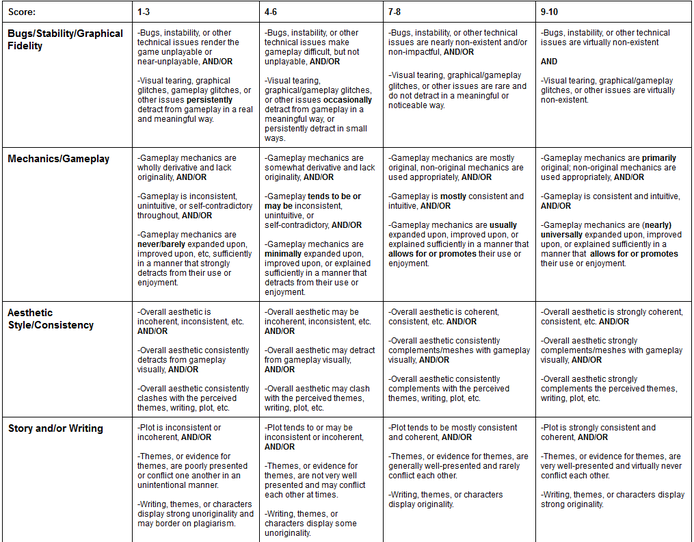Posted by: Alex Clippinger
This article is opinion. It represents the view of its writer and does not speak for GameShoe as a whole.
Over the past several days, I've witnessed many big-name journalists (or maybe they're bloggers, or just 'writers,' they have difficulty establishing this) saying that 'objectivity' is a silly thing to aim for. John Walker wrote an article at Rock, Paper, Shotgun wrote an entire opinion piece on the subject.
I can understand, to a point, where some of these writers are coming from. Reviews of an art (and regardless of your own views, let's continue on with the assumption that games are a form of artistic expression) cannot detach itself from opinion, prior experience, and even prejudice: a reviewers life experience, political views, prior knowledge of a game, knowledge of similar titles, similar genres, and so on are going to shape that reviewer's perceptions.
In light of this, we must accept that true objectivity cannot be achieved in game reviews, but only attempted.
"But why bother?" You ask. "If we agree that personal views can't be shaken, why bother attempting objectivity at all?"
The answer is--and I really don't mean to bring other societal issues into this--we attempt objectivity for the same reason we attempt to stamp out violence, sexism, and bigotry: because doing so is the right thing to do, and because constantly pushing ourselves toward it is, in disagreement with Walker's assessment, something that makes us better for doing so. We don't say "well, violence and racism will always exist in some form, so why bother?" We may subconsciously acknowledge these facts, but know that our overall social environment is improved when we persist in defiance of it. This same principle applies to journalism in general in regards to objectivity, accountability, and transparency.
How, then, can reviewers attempt to improve their objectivity?
There are a number of personal and professional standards that individuals can take to keep themselves accountable, and to improve their objectivity. Many of them may not seem suitable or practical to a given journalist/writer/etc. For my part, I will define two things that I will be doing personally in order to promote my attempted objectivity and transparency when reviewing games.
1. The Rubric.
"I've given Clash of Duties: Shady Operations 3 an 8/10."
That's wonderful, but what does that mean. Without context for the thought behind it, a number is just that--a number. It's arbitrary, meaningless. The use of a grading rubric can greatly improve the transparency, and also the consistency, of a reviewer's numbers. An 8/10 from three years ago should have the same overall level of quality, at least in the reviewer's somewhat subjective view, as an 8/10 today.
Some sites and reviewers already use something rubric-like, or at least split various aspects of a game (story, graphics, etc) into different categories. In the spirit of this, I've begun drafting my own, stringent rubric for personal use:
With the above, I want the body of my reviews--as well as the number scores I give games--to consistently reflect the ranges laid out above. I want readers of my reviews to have a better, more assured understanding of how or why I reach certain number-score conclusions.
Furthermore, having this rubric helps to keep my reviews and scores accountable. I want readers to be able to catch inconsistencies in my reviews, should I make a mistake. My overall body of work should reflect the guidelines that I have made for myself; if I cannot maintain my own standards, I am risking my integrity as a reviewer.
2. Critical Empathy.
A rubric can greatly help with transparency; but what can help to improve objectivity? The answer is what I call 'critical empathy.'
When watching a movie or playing a game (two things I often share my opinions of with friends and family), I rarely view it through the lens of what I 'expected' it to be. I've always found that approach to be utterly bizarre. Instead, I consciously observe a game or movie with the question, "What are the creators trying to present to me, based on what I'm experiencing and being shown?"
That is 'critical empathy.' Simply put, it's seeing a game as its evidence wants you to see it. For those English majors out there, this is basically a game-reviewer's version of New Criticism. In general, New Criticism believes in consciously recognizing and abandoning your prejudices, preferences, and expectations before approaching a work; criticism should be based on what evidence is actually being presented by the work. Games, though interactive and different from literary works in obvious ways, can be approached in the same way.
This seems obvious, doesn't it? "No shit, Sherlock," you say.
But the tricky thing about abandoning preconceived notions is that they really do have to be done consciously. There's a certain mental fortitude, or rather discipline, that reviewers can and should use when playing games. I believe that what I call 'critical empathy' should consciously be the norm of reviewers attempting to improve their own levels of objectivity.
Game reviewing will never be an exact science; in fact, they'd be horribly boring if they were. Many of the best gaming personalities review games through visceral, emotional reaction, and these videos and reviews are invaluable. Critical empathy in game reviewing, and rubrics to increase transparency and consistency across reviews, should not be universal and uniform; however, reviewers consciously looking to increase their level of 'professionalism' or to write more 'professional' reviews should strongly consider moves along these lines.
Readers should know where you stand with your reviews, or through consistency of review scores, know who they're dealing with.
Furthermore, having this rubric helps to keep my reviews and scores accountable. I want readers to be able to catch inconsistencies in my reviews, should I make a mistake. My overall body of work should reflect the guidelines that I have made for myself; if I cannot maintain my own standards, I am risking my integrity as a reviewer.
2. Critical Empathy.
A rubric can greatly help with transparency; but what can help to improve objectivity? The answer is what I call 'critical empathy.'
When watching a movie or playing a game (two things I often share my opinions of with friends and family), I rarely view it through the lens of what I 'expected' it to be. I've always found that approach to be utterly bizarre. Instead, I consciously observe a game or movie with the question, "What are the creators trying to present to me, based on what I'm experiencing and being shown?"
That is 'critical empathy.' Simply put, it's seeing a game as its evidence wants you to see it. For those English majors out there, this is basically a game-reviewer's version of New Criticism. In general, New Criticism believes in consciously recognizing and abandoning your prejudices, preferences, and expectations before approaching a work; criticism should be based on what evidence is actually being presented by the work. Games, though interactive and different from literary works in obvious ways, can be approached in the same way.
This seems obvious, doesn't it? "No shit, Sherlock," you say.
But the tricky thing about abandoning preconceived notions is that they really do have to be done consciously. There's a certain mental fortitude, or rather discipline, that reviewers can and should use when playing games. I believe that what I call 'critical empathy' should consciously be the norm of reviewers attempting to improve their own levels of objectivity.
Game reviewing will never be an exact science; in fact, they'd be horribly boring if they were. Many of the best gaming personalities review games through visceral, emotional reaction, and these videos and reviews are invaluable. Critical empathy in game reviewing, and rubrics to increase transparency and consistency across reviews, should not be universal and uniform; however, reviewers consciously looking to increase their level of 'professionalism' or to write more 'professional' reviews should strongly consider moves along these lines.
Readers should know where you stand with your reviews, or through consistency of review scores, know who they're dealing with.



